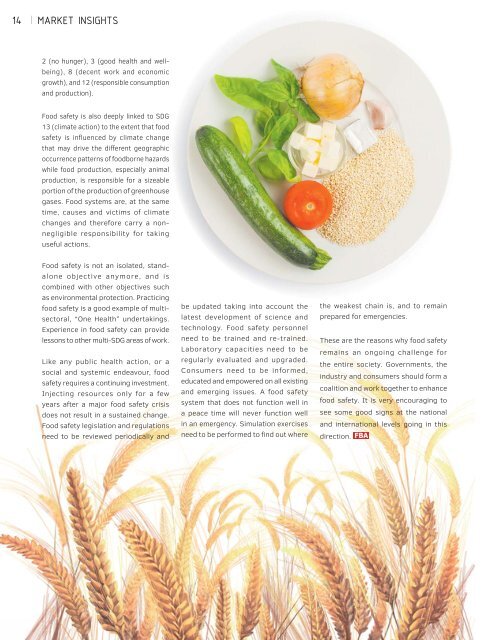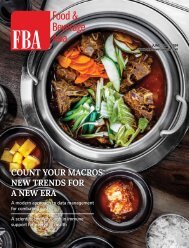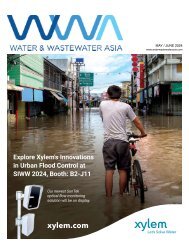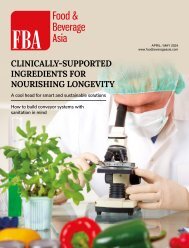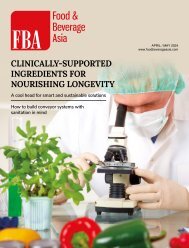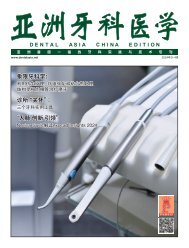Food & Beverage Asia February/March 2020
Food & Beverage Asia (FBA) is the leading source of food and beverage news in Asia since 2002. FBA delivers a comprehensive view of the food and beverage landscape, spanning across the latest health and nutrition trends and industry innovations in ingredients, recipe formulations, food science, sustainability, packaging, and automation, as well as advancements in agri and food-tech.
Food & Beverage Asia (FBA) is the leading source of food and beverage news in Asia since 2002. FBA delivers a comprehensive view of the food and beverage landscape, spanning across the latest health and nutrition trends and industry innovations in ingredients, recipe formulations, food science, sustainability, packaging, and automation, as well as advancements in agri and food-tech.
You also want an ePaper? Increase the reach of your titles
YUMPU automatically turns print PDFs into web optimized ePapers that Google loves.
14<br />
MARKET INSIGHTS<br />
2 (no hunger), 3 (good health and wellbeing),<br />
8 (decent work and economic<br />
growth), and 12 (responsible consumption<br />
and production).<br />
<strong>Food</strong> safety is also deeply linked to SDG<br />
13 (climate action) to the extent that food<br />
safety is influenced by climate change<br />
that may drive the different geographic<br />
occurrence patterns of foodborne hazards<br />
while food production, especially animal<br />
production, is responsible for a sizeable<br />
portion of the production of greenhouse<br />
gases. <strong>Food</strong> systems are, at the same<br />
time, causes and victims of climate<br />
changes and therefore carry a nonnegligible<br />
responsibility for taking<br />
useful actions.<br />
<strong>Food</strong> safety is not an isolated, standalone<br />
objective anymore, and is<br />
combined with other objectives such<br />
as environmental protection. Practicing<br />
food safety is a good example of multisectoral,<br />
“One Health” undertakings.<br />
Experience in food safety can provide<br />
lessons to other multi-SDG areas of work.<br />
Like any public health action, or a<br />
social and systemic endeavour, food<br />
safety requires a continuing investment.<br />
Injecting resources only for a few<br />
years after a major food safety crisis<br />
does not result in a sustained change.<br />
<strong>Food</strong> safety legislation and regulations<br />
need to be reviewed periodically and<br />
be updated taking into account the<br />
latest development of science and<br />
technology. <strong>Food</strong> safety personnel<br />
need to be trained and re-trained.<br />
Laboratory capacities need to be<br />
regularly evaluated and upgraded.<br />
Consumers need to be informed,<br />
educated and empowered on all existing<br />
and emerging issues. A food safety<br />
system that does not function well in<br />
a peace time will never function well<br />
in an emergency. Simulation exercises<br />
need to be performed to find out where<br />
the weakest chain is, and to remain<br />
prepared for emergencies.<br />
These are the reasons why food safety<br />
remains an ongoing challenge for<br />
the entire society. Governments, the<br />
industry and consumers should form a<br />
coalition and work together to enhance<br />
food safety. It is very encouraging to<br />
see some good signs at the national<br />
and international levels going in this<br />
direction. FBA


